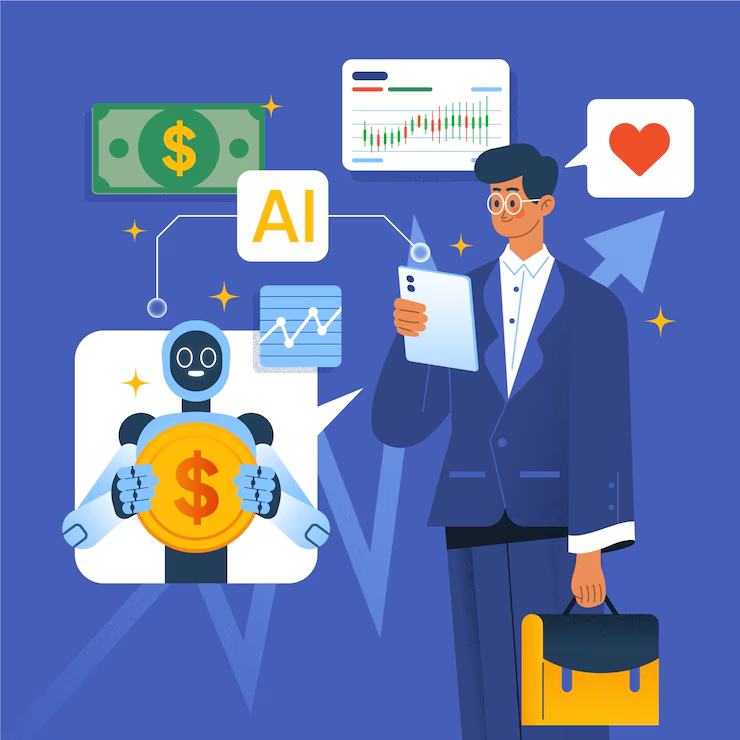Introduction
Agentic AI: In the dynamic world of technology, a revolutionary new trend is making waves across industries: Agentic AI. This advanced form of artificial intelligence extends beyond traditional generative AI by enabling systems to act autonomously, making independent decisions to achieve specific objectives without human intervention. This new frontier promises to transform how businesses operate, enhancing efficiency and driving innovation.
Agentic AI systems are designed to perform a range of tasks autonomously, from data analysis and customer service to complex problem-solving across integrated systems like CRMs and ERP solutions. They are equipped with the capability to learn from interactions and adapt to new situations, which allows for continuous improvement in performance and responsiveness.
One of the core strengths of agentic AI is its ability to reduce operational overheads significantly. By automating both routine and complex tasks, these systems allow businesses to focus on strategic goals while managing day-to-day operations more efficiently. This shift is supported by a new “service-as-a-software” model, where businesses no longer purchase traditional software licenses but instead pay for the outcomes produced by AI agents. This model not only drives efficiency but also offers cost-effective solutions to businesses, allowing them to scale operations without a corresponding increase in expenses.
Agentic AI Statistics
- Based on data from PWC, the 27th Annual CEO Survey highlights that 73% of CEOs in the Middle East believe Generative AI (GenAI) will significantly transform how businesses create, deliver, and capture value over the next three years.
- By 2030, GenAI is projected to have a massive economic impact, potentially adding between $2.6 trillion and $4.4 trillion annually to the global economy across multiple industries. In the energy sector alone, investments in GenAI are expected to skyrocket from $40 billion in 2023 to more than $140 billion by the end of the decade.
- Meanwhile, research from Salesforce reveals strong public enthusiasm for AI solutions. An impressive 90% of people worldwide say they’d be willing to use AI tools to interact with their governments.
- This support comes alongside widespread frustration with current systems: 40% of respondents report challenges when trying to get help or answers from government services. Moreover, less than half find it easy to understand the public services (42%) or assistance programs (46%) available to them.
- A global survey found that 90% of respondents are open to using AI agents to interact with the public sector. Countries like Brazil, Spain, Singapore, and Italy stand out, with their citizens showing a particularly strong willingness to embrace AI-powered services. These nations have a unique chance to lead the way into a future where AI agents play a key role.
- In Germany and the U.S., 1 in 5 people (20%) say they are very likely to use an AI agent for tasks like filing taxes or completing government applications.
- When considering AI in the public sector, respondents worldwide highlighted three key benefits: 47% value 24/7 access to information and services, 44% prioritize faster and more efficient access to government resources and 40% want fewer websites and steps to solve their needs.
Comparison AI Features
| Feature | Agentic AI | Generative AI | Traditional AI |
| Primary Function | Goal-oriented action & decision-making | Content generation (text, code, images, etc.) | Focused on automating repetitive tasks |
| Autonomy | High – Operates with minimal human oversight | Variable – May require user prompts or guidance | Low – Relies on specific algorithms and set rules |
| Learning | Reinforced Learning – Improves through experience | Data-driven learning – Learns from existing data | Relies on predefined rules and human intervention |
Source: aisera.com
Real-World Applications
- Human Resources Management: Agentic AI enhances recruitment processes by automating candidate screening and managing employee records efficiently, leading to data-driven decision making and reduced administrative burdens.
- Customer Service: Enhanced by agentic AI, customer support experiences become more efficient and personalized through AI-powered chatbots that provide 24/7 assistance, improving customer satisfaction and operational efficiency.
- Finance: In the financial sector, agentic AI is crucial for fraud detection and autonomous trading, where it processes vast amounts of data quickly to identify fraudulent activities and execute timely trades.
- Healthcare: Agentic AI improves patient management by optimizing treatment plans and predicting patient needs, thereby enhancing both efficiency and patient outcomes.
- Manufacturing: Used in manufacturing, agentic AI monitors equipment performance, predicts maintenance needs, and optimizes production lines, significantly boosting productivity and reducing downtime.
Industries Impacted by Agentic AI
- Retail: Agentic AI personalizes shopping experiences by managing inventory and automating customer interactions, transforming the retail landscape.
- Education: In education, agentic AI tailors learning experiences by adjusting educational content based on individual student performance, enhancing engagement and educational outcomes.
- Transportation: Agentic AI is pivotal in developing autonomous vehicles, improving safety, and optimizing traffic management, reshaping transportation dynamics.
- Energy Management: In energy sectors, agentic AI employs smart grids to optimize energy distribution and usage, leading to more efficient energy management and reduced waste.
- Entertainment: In the entertainment industry, agentic AI tailors content recommendations to individual preferences, enhancing viewer engagement and satisfaction.
Benefits
- Increased Efficiency: By automating routine and complex tasks, agentic AI allows businesses to operate more efficiently and focus on strategic initiatives.
- Enhanced Decision Making: With its capability to analyze vast amounts of data rapidly, agentic AI supports better, quicker decision-making processes.
- Scalability: Agentic AI adapts easily to growth and changing demands without significant increases in overhead, supporting business expansion and diversification.
- Personalization: Through advanced data analysis, agentic AI offers personalized experiences to users in various domains, from retail to healthcare, significantly improving user satisfaction.
- Cost Reduction: By streamlining operations and reducing the need for manual intervention, agentic AI significantly cuts operational costs across industries.
Challenges and Ethical Considerations
- Bias and Fairness: Agentic AI, like all AI, is susceptible to biases inherent in the data it learns from. This can lead to unfair outcomes across various applications, such as recruitment or law enforcement, reinforcing existing societal inequalities unless carefully managed.
- Privacy and Security: The extensive data collection required for agentic AI’s functionality raises significant privacy concerns. Misuse or breach of this data can have serious implications, making robust security measures and ethical data handling practices essential.
- Autonomy and Control: The degree of autonomy granted to AI systems is a major ethical concern, particularly when these systems make decisions in critical areas like healthcare or defense. Establishing boundaries and maintaining human oversight is crucial to mitigate risks.
- Job Displacement: The automation capabilities of agentic AI may lead to significant job displacement. Addressing the social and economic impacts of this displacement, such as through retraining programs or policy changes, is a pressing ethical issue.
- Legal and Ethical Responsibility: As agentic AI systems make more autonomous decisions, determining accountability when things go wrong becomes complex. Clear legal and regulatory frameworks are needed to address these challenges, ensuring that AI systems can be held accountable and that their actions are transparent.
The Future of Agentic AI
Looking forward, the evolution of agentic AI is poised to radically transform how we interact with technology, integrating more deeply into daily life and business operations. As these systems become more capable and autonomous, they will increasingly handle complex, multi-step tasks with little to no human oversight. This promises significant gains in efficiency and effectiveness across various sectors, including healthcare, finance, and manufacturing.
However, this progress also brings challenges, particularly in ensuring that agentic AI systems operate safely, ethically, and transparently. The future will likely focus on developing more sophisticated methods for aligning AI behavior with human values and ethical standards. This includes advances in explainable AI, which aims to make AI decisions more understandable to humans, and improved regulatory frameworks that keep pace with technological advancements.
Moreover, as agentic AI becomes more common, the emphasis will be on collaborative efforts that involve various stakeholders, including technologists, ethicists, policymakers, and the public, to guide the development and deployment of these technologies responsibly. Such collaboration will be essential to harness the benefits of agentic AI while managing its risks effectively, ensuring that it contributes positively to society.
Source:
- https://www.fxmweb.com/insights/ai-agents-in-action-real-world-applications-of-agentic-ai.html
- https://www.ampcome.com/post/top-20-agentic-ai-use-cases-with-real-life-examples
- https://integrail.ai/blog/agentic-ai-examples
- https://toxigon.com/agentic-ai-ethical-considerations
- https://scet.berkeley.edu/the-next-next-big-thing-agentic-ais-opportunities-and-risks/
- https://carbonnen.com/ethical-considerations-in-agentic-ai-development/
- https://www.rpatech.ai/ai-agentic-ethics/
- https://www.moveworks.com/us/en/resources/blog/agentic-ai-examples-use-cases

Jeffrey is acting editor in chief of AmazingNews24 with over seven years of experience in the field of online news under his belt. Jeffrey has worked with multiple media houses and is currently leading a team of journalists, sub-editors and writers through his entrepreneurial endeavours.



